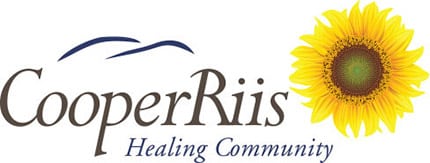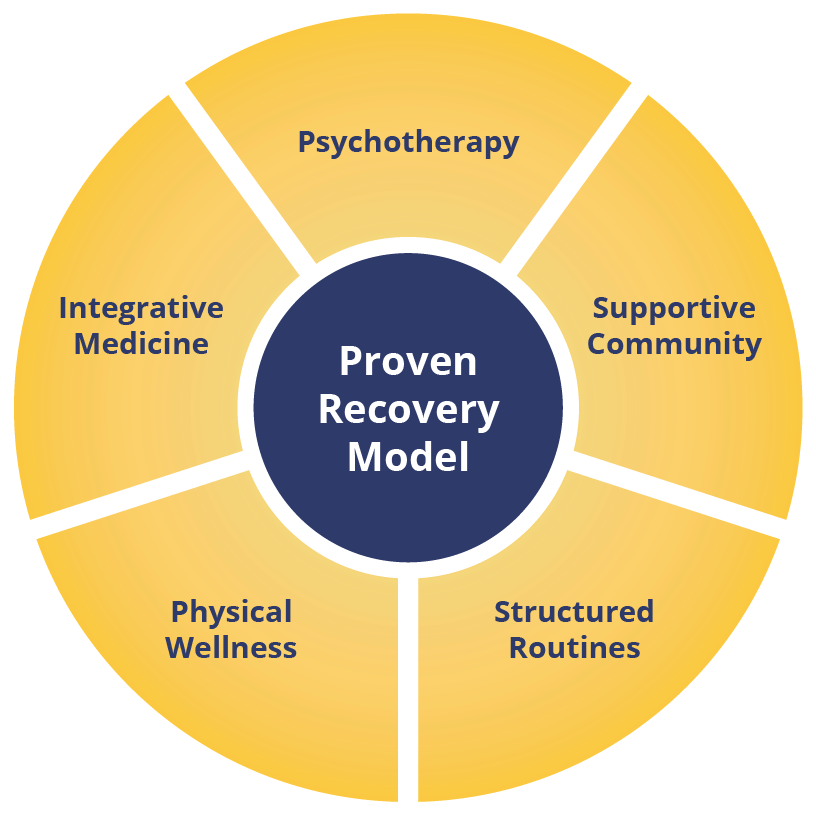Understanding Our Approach
& Programs for Anxiety
A holistic approach
The recovery model of mental health care
Community and family support
Balanced independence
Person-centered therapy
Empowered living through goals and own-purpose
Why choose CooperRiis?
We are committed to helping every resident navigate their recovery using compassionate and evidence-based support. A few things that make CooperRiis different are:
- Comprehensive residential and transitional programs
- Involving residents’ families in their care
- A proven recovery-oriented model
- Flexible insurance and payment options
- A safe, supportive, and engaging community-based approach
- Accredited by CARF for excellence in care
What is the Mental Health Recovery Model?
The recovery model is a person-centered approach that empowers residents to become excellent stewards of their own well-being. Unlike a maintenance-oriented treatment model, which tends to focus primarily on managing symptoms, recovery emphasizes holistic healing, goal-setting, and building a fulfilling life beyond anxiety.
Who are our anxiety treatment programs for?
Our residential anxiety treatment programs are designed for people 18 and older who are struggling with anxiety and who:
- Seek a holistic, person-centered approach combining clinical care with wellness-focused habits and inner work.
- Would do well in a structured, community environment that encourages personal growth.
- Require a higher level of care than outpatient services but don’t need hospitalization.
Our live-in anxiety treatment programs offer the support, tools, and community to help residents transcend their diagnosis to experience fulfillment and reduce or avoid major life disruptions due to their anxiety disorder.
Who are our anxiety programs not for?
Our residential anxiety programs are not for anyone who:
- Is under age 18.
- Is in an immediate crisis that calls for hospitalization.
- Cannot participate in a structured, recovery-focused community.
- Is in certain stages of dual diagnosis.
- Has a background of safety-threatening issues like aggression, arson, or sexual offense.
We carefully assess each applicant to ensure a safe, supportive environment for all of our residents. If our anxiety treatment program isn’t the right fit for you or your loved one, we’ll happily provide referrals for recovery programs or specialized care that could be a better fit.
Is this anxiety recovery program residential?
Yes, CooperRiis residential treatment is a big part of our anxiety recovery approach. Key features of our residential programs include:
- 24/7 support in a safe, home-like environment.
- A strong focus on self-care, personal growth, and long-term healing.
- Holistic treatment, incorporating therapy, life skills, and wellness practices.
- The option for a longer stay if needed to facilitate lasting recovery.
- A therapeutic community that cultivates peer support and connection.
- Flexible admission options, including step-down care from hospitalization or step-up from outpatient.
Residents also have access to transitional housing with outpatient programs to improve their success in independent living later.
Does CooperRiis offer inpatient level of care?
At CooperRiis, we provide compassionate residential anxiety treatment in a healthy and supportive home-like center. While residential anxiety treatment centers provide a structured setting for long-term progress, the term inpatient typically refers to short-term hospitalization for acute mental health crises.
If inpatient anxiety treatment is needed before joining our program, our admissions team can help guide you toward the right resources, ensuring you or your loved one receive(s) the right kind of support.
Where is CooperRiis located?
CooperRiis is located in Western North Carolina’s Blue Ridge Mountains. Our Asheville campus, in the historic Montford Area, features a beautiful mid-century building on four acres of rolling hills and mature trees. The Mill Spring Farm offers 94 acres with gardens, greenhouses, trails, a pond, an art barn and woodshop, plus tennis, basketball, and pickleball courts.
What is your approach at CooperRiis?
At CooperRiis, we take a holistic approach to anxiety recovery, integrating mind and heart to help residents achieve fulfillment and independence. Our residential anxiety treatment model is designed to support long-term healing through:
- Personalized dream statement: Residents develop a roadmap of their hopes and goals, focusing on wellness and possibility.
- Healing community: Connection is key—residents share work, meals, and activities, fostering a sense of belonging.
- Holistic care: Our program integrates therapy, wellness practices, nutrition, exercise, and self-esteem building as part of a comprehensive anxiety treatment program.
- Individualized support: With a resident-to-staff ratio better than 1:1, each individual receives highly personalized attention.
This compassionate, structured approach helps residents on their path to lasting recovery, guiding them toward their best health and most meaningful life.
Does CooperRiis take insurance?
CooperRiis accepts Aetna, Cigna, and Blue Cross Blue Shield of North Carolina for in-network coverage for our Asheville program. We also submit to out-of-network insurance providers for both the Asheville and Farm programs. Transitional housing is private pay. Visit our Insurance and Fees page for more details.
What is the cost of your residential anxiety treatment program?
Costs vary by program. The Asheville residential program is $950 per day, while The Farm is $26,000 per month with potential rate reductions starting in the third month. Transitional housing through our Asheville Community Program is $12,500 per month for the higher level of support and $4000 per month for lower support needs. Learn more on our Insurance and Fees page.
What anxiety programs do you offer?
CooperRiis offers programs tailored to support recovery from anxiety, emphasizing holistic care and personal growth:
- Therapeutic healing farm: A residential program combining evidence-based therapies with farm activities like gardening and animal care to foster resilience and connection.
- Short-term residential program: Clinically intensive care in Asheville for shorter stays, focusing on psychotherapy, psychiatry, and wellness services in a restorative setting.
- Transitional living: Supports independence with ongoing therapy and real-world skill building.
Each program incorporates holistic approaches like mindfulness, nutrition, fitness, and life skills training to promote long-term recovery and help individuals reclaim their lives.
How long do the treatment programs for anxiety last?
Each person’s journey is unique, and length of stay depends on their individual goals and readiness for independent living. In general, typical stays are as follows:
- Asheville program: 45–90 days
- Farm program: 3–6 months
- Transitional living: 6–12 months
Recovery is Possible
What to Expect with CooperRiis’ Care
We are deeply committed to a model that places each resident at the center of their own healing and recovery, ensuring that every individual’s journey is unique. However, certain methods and core principles form the foundation of the compassionate and effective care we provide as part of our mental health recovery programs.
A Healing Environment
Exercise & Nutrition
Integrative Medication Approach
Compassionate Communication
Mindfulness Practices
Therapeutic Approaches
Motivational Interviewing
Family Education
Learn More About Anxiety
Authored by Eric Levine, Ed.D. and Reviewed by Amy Zimmerman, DO Psychiatrist
Understanding our mental and emotional landscapes is vital for navigating life effectively. Similarly, recognizing a loved one’s experience with anxiety fosters compassion, strengthens support, and deepens relationships. Below are common questions about anxiety, along with concise answers.
What is anxiety?
Anxiety is a common mental health condition characterized by persistent worry, fear, and physical symptoms that interfere with daily life. While occasional anxiety is a normal response to stress, clinical anxiety is often overwhelming and disruptive. Emerging research recognizes neurobiological differences that affect brain function in areas related to stress response and emotional regulation. These differences can impact sleep, concentration, energy levels, and physical health. Anxiety is one of the most prevalent mental health conditions, affecting millions of people across the U.S. Women experience symptoms of anxiety at nearly twice the rate of men.
What are the different types of anxiety disorders?
Anxiety disorders are classified by cause, duration, and symptoms; and they may occur without a clear external cause. Utilizing these distinctions, we’re able to develop effective, personalized anxiety treatment for our residents. The most common anxiety disorders are:
- Generalized anxiety disorder (GAD): Persistent and excessive worry, often without a clear cause. Symptoms may include restlessness, muscle tension, difficulty concentrating, and sleep disturbances.
- Panic disorder: Characterized by sudden, intense panic attacks that cause physical symptoms like a racing heart, shortness of breath, and dizziness. These episodes can occur unexpectedly or in response to specific triggers.
- Social anxiety disorder: An intense fear of social situations, often leading to avoidance and significant distress in everyday interactions.
- Obsessive-compulsive disorder (OCD): Intrusive, unwanted thoughts (obsessions) and repetitive behaviors (compulsions) performed to reduce anxiety.
- Post-traumatic stress disorder (PTSD): A disorder that develops after experiencing or witnessing a traumatic event, leading to flashbacks, nightmares, and heightened anxiety.
- Separation anxiety disorder: Most often experienced by children; but adults may also feel excessive fear of being separated from loved ones or familiar environments.
- Agoraphobia: An anxiety disorder characterized by an overwhelming fear of being helpless or unable to escape in certain environments like crowds, public areas, or enclosed spaces like theaters or stores.
- Other phobias: Like agoraphobia, other phobias are intense, irrational fears of specific objects or situations. Examples include acrophobia (heights), aerophobia (flying), and iatrophobia (medical procedures).
What are the signs and symptoms of anxiety?
Anxiety can manifest differently for each person, but common symptoms include:
- Persistent worry, nervousness, or fear that feels difficult to control and interferes with normal functioning or life satisfaction.
- Physical symptoms such as a racing heart, shortness of breath, dizziness, or muscle tension.
- Restlessness or agitation, often feeling “on edge.”
- Difficulty concentrating or feeling as though your mind is racing.
- Sleep disturbances, including insomnia or trouble staying asleep.
- Excessive fatigue, even when well-rested.
- Irritability or heightened stress reactivity.
- Avoiding certain situations or places because of fear or discomfort.
- Gastrointestinal issues like nausea or digestive problems that are linked to stress.
- Panic attacks, which may include sweating, trembling, a sense of impending doom, or feeling detached from reality.
How do you recover from anxiety?
Research shows that Cognitive Behavioral Therapy (CBT), lifestyle changes such as regular exercise, and, in some cases, medication can significantly reduce symptoms and support long-term anxiety recovery. A personalized treatment plan that integrates these elements offers the best outcomes. Some of the modalities we may employ to support residents’ recovery for specific anxiety disorders are as follows:
- GAD: Effective generalized anxiety disorder treatment often includes cognitive behavioral therapy (CBT), mindfulness techniques, and lifestyle modifications that nurture the nervous system.
- Panic disorder: Panic disorder treatment may be centered around mindfulness and relaxation training as well as medication to reduce the frequency and severity of attacks.
- OCD: OCD treatment at CooperRiis might include person-centered exposure and response prevention (ERP) therapy, CBT, and sometimes medication.
- PTSD: Treatment often incorporates trauma-focused therapy and EMDR, as well as mindfulness and somatic therapy to support emotional regulation.
- Agoraphobia: Holistic agoraphobia treatment may involve CBT, exposure therapy, and EMDR. Similar methods are helpful for other phobias as well.
If you are interested in learning more about whether our residential anxiety recovery program is right for you or your loved one, visit our admissions page to start a conversation.
Additional Resources for Understanding Anxiety
Our Recovery Model Works
An extensive body of research and clinical experience affirms these findings:
Combining psychotherapy with a strong, supportive community, structured daily routines, physical wellness programs, and an integrative approach to medication can dramatically improve the lives of those with anxiety.
Data collected over 10 years show that the residential treatment program for anxiety at CooperRiis works. Individuals who benefit from our holistic, recovery-focused model of care make demonstrable progress in multiple domains of health:

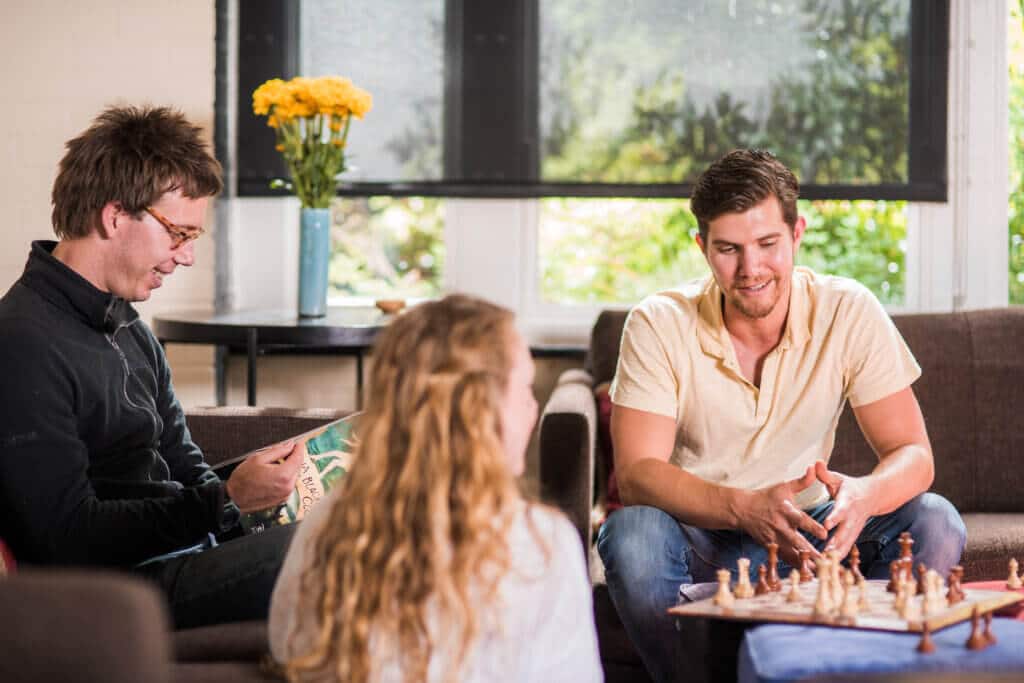
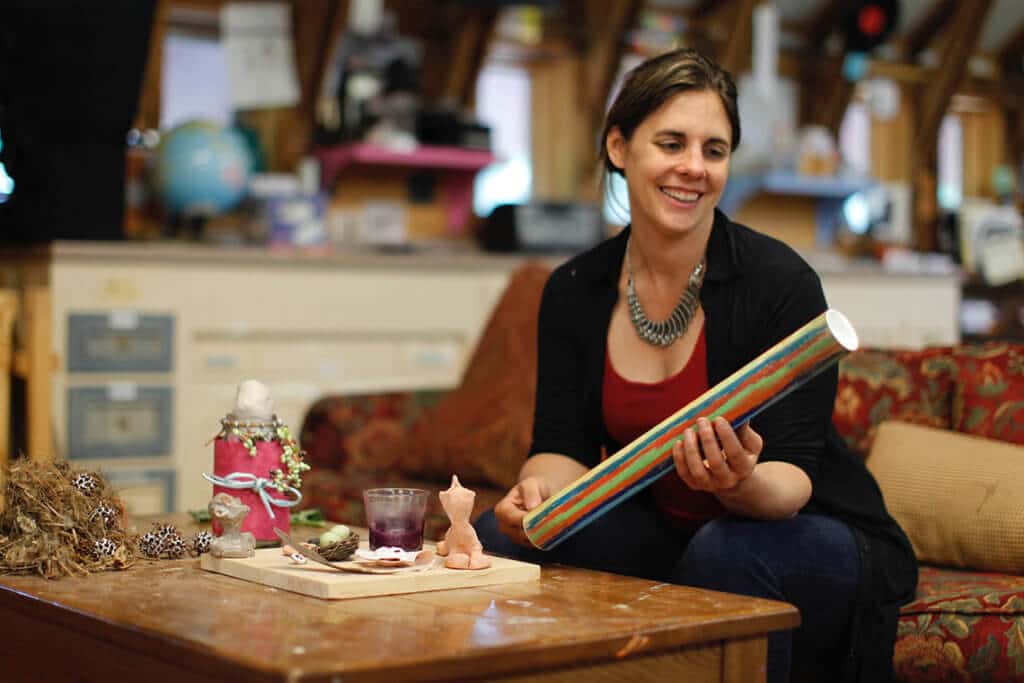

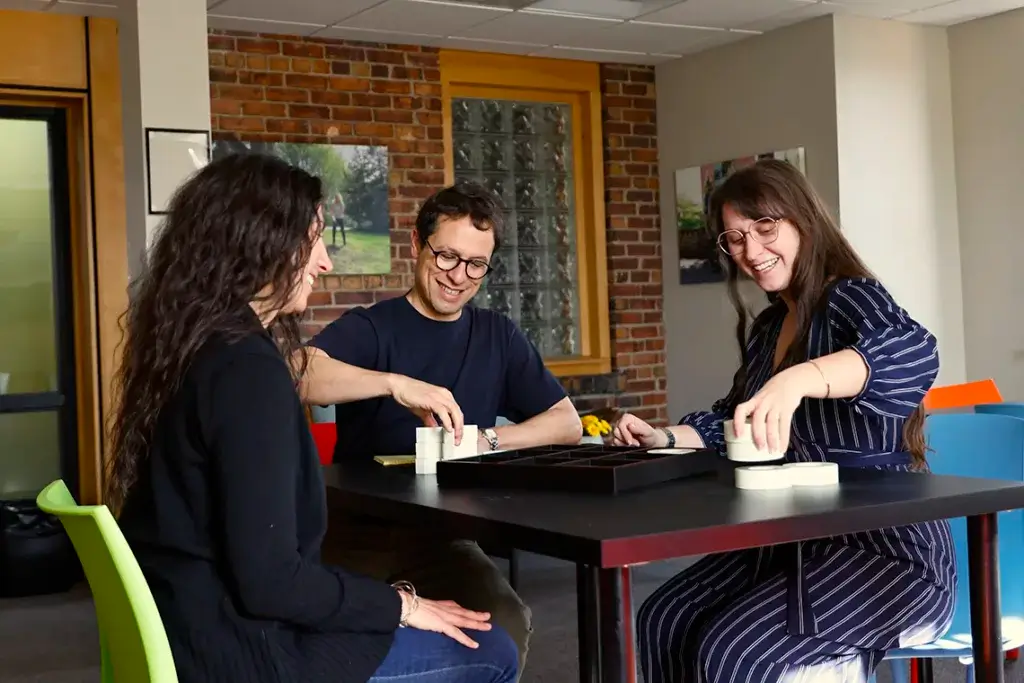
Where Respect Meets Recovery
Research Citations
1Firth J, Gangwisch J E, Borsini A, Wootton R E, Mayer E A. Food and mood: how do diet and nutrition affect mental wellbeing? BMJ 2020; 369 :m2382 https://doi.org/10.1136/bmj.m2382
2Tomita, A., Lukens, E. P., & Herman, D. B. (2014). Mediation analysis of critical time intervention for persons living with serious mental illnesses: Assessing the role of family relations in reducing psychiatric rehospitalization. Psychiatric Rehabilitation Journal, 37(1), 4–10. https://doi.org/10.1037/prj0000015
